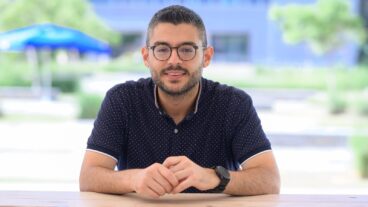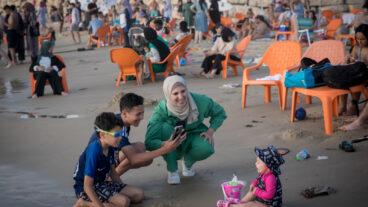Religious and political views get checked at the door when the Turkish sailors show up for practice with their Israeli coach.
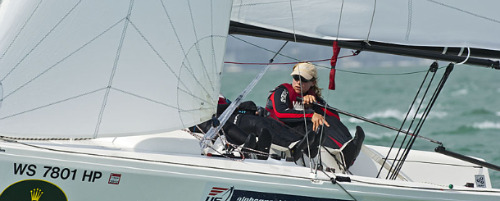
When two teams of Turkish sailors arrived in the Haifa seaport on July 22 to compete in the International 420 Class World Championships, their beloved Israeli coach was waiting to greet them.
If it seems odd that such an occurrence happened less than two months after the infamous “Free Gaza Flotilla” incident, that pitted Turkish political activists against Israeli soldiers in the Mediterranean Sea, that’s only because the story of Linur Kliger and her Turkish protégés is not as well-known.
Kliger, 28, grew up in what could be described as Israel’s First Family of sailing. Her father managed a sailing school in Tel Aviv and her mother, a windsurfer, instructed sailing coaches. Her brother Gidi represented Israel in the 2004 Athens Olympics and the 2008 Beijing Olympics with his sailing partner, Udi Gal.
Linur Kliger won the International 420 Youth World Championship in 1998, and later earned a spot on Israel’s national team. After failing to qualify for the Athens Olympics, she coached Israel’s International 470 Class youth team to silver and bronze medals in the European Championships, and then began coaching Israel’s national women’s windsurfing team.
Love of sailing is their common language
Last year, the chairwoman of the Turkish Sailing Federation asked Kliger to come four times a year to supervise training for its eight youth teams. Over the course of those visits, she forged a close relationship with the young sailors and their Turkish coach – using English, and a love of sailing, as their common language.
Just one week after the flotilla incident in early June that strained relations between the two Mediterranean countries, Kliger was scheduled for the fourth of her visits. “I was worried, but [the federation chairwoman] said it was not a problem. She said, ‘If you don’t feel comfortable, you can stay in our house.’ I think the situation just made the relationship stronger. They made me feel they respect me even more,” Kliger tells ISRAEL21c.
Nor does it matter that the teens she coaches are mostly Muslims. Religious and political views get checked at the door when the sailors show up for practice.
“They are normal kids and they hear things, but they were anxious to come to Israel for the championships,” says Kliger. “They had been here in April and I don’t think they thought twice about coming back in July.”
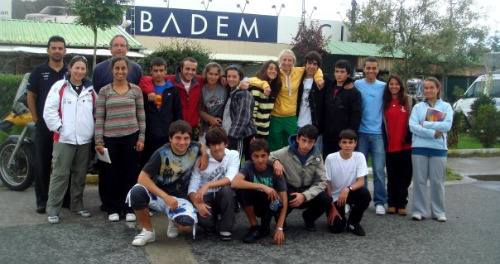
The 10-day championships drew 160 boats and 320 competitors from countries such as Australia, Brazil, China, France, Germany, Great Britain, Greece, Italy, Japan, Portugal, Spain, Switzerland, the United States and the US Virgin Islands, in addition to Israel.
Laughing at the politics
In his welcoming statement to the athletes, Haifa Mayor Yonah Yahav said, “Haifa is a city whose 270,000 citizens have created a solid foundation of tolerance and communication; a city that boasts a tradition of over 100 years of coexistence between members of all religions and congregations.”
Organizers treated competitors to receptions and Israeli folklore evenings, free guided tours of Israeli sites, and transportation to and from the beachfront competition site to hotels, entertainment, and shopping centers. The city was specially decorated for the event, which began on a Thursday night instead of the traditional Friday night, in respect of the Jewish Sabbath.
The members of the two top Turkish teams – four girls and four boys – who arrived in Haifa for the world championships “get so much love from the Israelis that they feel comfortable here,” says Kliger. “The Israeli people have warm hearts; that’s what makes us special. The kids can see that people here are kind, that they don’t care where they come from or what their religion is.”
The seasoned sailor says she knows many Israelis have changed vacation plans to stay away from Turkey this summer. “For me, everything is the same. I don’t think these people are our enemy,” she says. “I have so many friends from sports from so many countries and if we talk about politics at all, it’s just to laugh about the problems.”
Kliger, who began sailing at age six, earned her bachelor’s degree in 2008 at Shenkar College of Engineering and Design, near her Tel Aviv home. She is working toward a master’s degree in sports organization and management at a Swiss university.
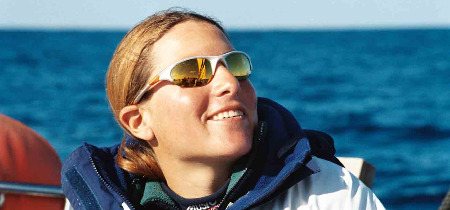
In between school and coaching in Israel and Turkey, Kliger is also involved in an effort to get a new sailing class approved by the Israeli Olympic Committee: match racing with 6-foot yachts called Elliott keelboats. The Israel Yachting Association bought a couple of the boats so that Kliger and her teammates can begin earning a reputation for the sport, which is like tennis in that only two teams compete at once. The matches are held close to shore, which Kliger says is better for spectators and media coverage alike.
Over the next month, she may have to choose which part of her busy schedule she will have to sacrifice if the match racing team is to be Olympic-bound. For now, she is content to keep doing her part for international relations. She was particularly proud when the Turkish delegation proclaimed at the opening ceremonies of the Youth World Championship, “Israel, we love you!” to great applause. “It was nice to hear,” she says.





